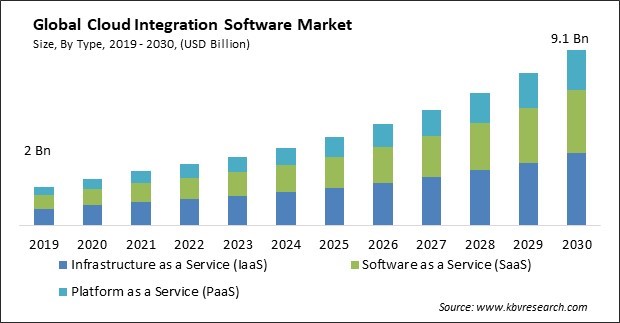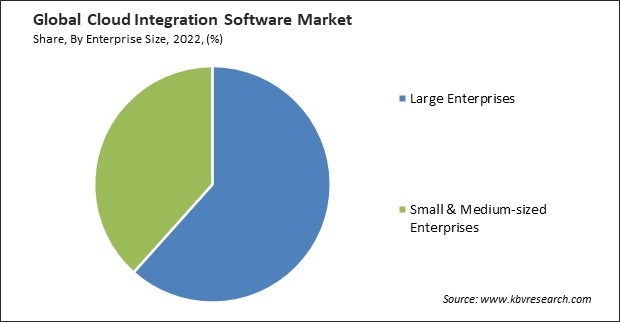The Global Cloud Integration Software Market size is expected to reach $9.1 billion by 2030, rising at a market growth of 14.3% CAGR during the forecast period.
Cloud Integration Software enhances the agility and scalability of IT and telecommunications operations. Therefore, the IT & Telecommunication segment acquired $876.5 million in 2022. Organizations can rapidly adapt to changing demands, scale resources as needed, and deploy new services or updates without extensive manual intervention. Integration solutions bridge the gap between diverse systems, applications, and data sources. This enhanced connectivity ensures interoperability across different components of IT and telecommunications ecosystems, fostering a cohesive and integrated infrastructure. Some of the factors impacting the market are growing emphasis on data analytics and business intelligence, rise of hybrid and multi-cloud environments, and adhering to data governance policies and regulatory compliance standards.

Cloud integration software enables businesses to integrate data from various sources like databases, applications, and external platforms. This is crucial for BI initiatives, as data from different departments and systems needs to be aggregated for comprehensive analysis. As data volumes grow exponentially, cloud integration solutions provide the scalability to handle large datasets. BI platforms can seamlessly access and analyze vast amounts of data stored in the cloud, supporting the evolving analytics needs of organizations. Additionally, hybrid and multi-cloud environments involve using different cloud providers and on-premises infrastructure. Cloud integration software enables seamless interoperability between these diverse environments, allowing businesses to integrate, manage, and move data and applications across platforms. Additionally, cloud integration solutions provide the flexibility and scalability to adapt to changing business requirements. Associations can scale their infrastructure up or down based on demand, and cloud integration ensures smooth communication between on-premises and cloud resources. As businesses increasingly embrace the benefits of these diverse cloud strategies, the demand for robust cloud integration solutions will likely continue growing, positively impacting the cloud integration software market.
However, regulatory environments, with stringent data protection laws and industry-specific regulations, can be complex. Navigating these requirements adds complexity to the development and deployment of cloud integration solutions, as providers must ensure that their offerings align with diverse and evolving compliance standards. Different regions and countries have data protection and privacy regulations, such as GDPR in Europe, HIPAA in the United States, and PDPA in Singapore. Cloud integration software must be adaptable to varying legal frameworks, which can require customization based on the geographic locations where the solution is deployed. Cloud integration solutions must support organizations in managing data ownership and implementing mechanisms for obtaining and managing consent throughout the data lifecycle. Due to the above factors, market growth will be hampered in the coming years.
On the basis of type, the cloud integration software market is segmented into infrastructure as a service (IaaS), software as a service (SaaS), and platform as a service (PaaS). In 2022, the infrastructure as a service (IaaS) segment dominated the cloud integration software market with the maximum revenue share. Infrastructure as a Service in cloud integration software refers to the foundational cloud computing service that provides virtualized computing resources, like servers, storage, and networking, to support the deployment of integration solutions. When integrating various applications and systems in the cloud, IaaS plays a critical role by offering the necessary infrastructure components. IaaS's pay-as-you-go model contributes to cost efficiency in cloud integration. Organizations only pay for the resources consumed, destroying the need for substantial upfront assets in hardware.
Based on enterprise size, the cloud integration software market is fragmented into large enterprises and small & medium sized enterprises. The small & medium size enterprises segment garnered a significant revenue share in the cloud integration software market in 2022. Many small and medium-sized companies are adopting cloud solutions as they help them save costs and enable scalability, thus driving market growth. SMEs can use cloud integration software to scale their operations as they grow without significant upfront infrastructure costs. Cloud Integration Software is the connective tissue for disparate systems, applications, and data sources. SMEs can seamlessly integrate their existing tools and technologies, fostering improved collaboration, data flow, and business process automation.

By end use, the cloud integration software market is classified into IT & telecommunication, BFSI, healthcare, retail & e-commerce, manufacturing, and others. The BFSI segment recorded a remarkable revenue share in the cloud integration software market in 2022. Integration solutions in the BFSI sector facilitate integrating customer relation management (CRM) systems with banking applications. This integration allows a unified view of customer data, empowering banks and insurance companies to provide personalized services and targeted marketing strategies. Real-time data access is crucial in BFSI for making informed decisions and providing timely services. Cloud integration ensures that data is synchronized across various systems, providing a real-time and accurate view of financial transactions, customer interactions, and market trends.
| Report Attribute | Details |
|---|---|
| Market size value in 2022 | USD 3.2 Billion |
| Market size forecast in 2030 | USD 9.1 Billion |
| Base Year | 2022 |
| Historical Period | 2019 to 2021 |
| Forecast Period | 2023 to 2030 |
| Revenue Growth Rate | CAGR of 14.3% from 2023 to 2030 |
| Number of Pages | 265 |
| Number of Table | 370 |
| Report coverage | Market Trends, Revenue Estimation and Forecast, Segmentation Analysis, Regional and Country Breakdown, Porter’s 5 Forces Analysis, Company Profiling, Companies Strategic Developments, SWOT Analysis, Winning Imperatives |
| Segments covered | Type, Enterprise Size, End Use, Region |
| Country scope |
|
| Companies Included | Salesforce, Inc., IBM Corporation, Microsoft Corporation, Amazon Web Services, Inc. (Amazon.Com, Inc.), Citrix Systems, Inc. (Cloud Software Group, Inc.), Oracle Corporation, Informatica Inc., Verizon Communications, Inc., VMware, Inc. (Broadcom Inc.), and DXC Technology Company |
| Growth Drivers |
|
| Restraints |
|
Region-wise, the cloud integration software market is analysed across North America, Europe, Asia Pacific, and LAMEA. In 2022, the North America region witnessed the largest revenue share in the cloud integration software market. The presence of developed cloud infrastructure in the region creates opportunities for the seamless deployment and operation of cloud integration solutions. Many companies are launching solutions to cater to the increasing demand for cloud-integrated solutions. For instance, in October 2023, Boomi, an automation and intelligent connectivity company, introduced the Silicon Valley Boomi Partner Summit, a new program for software providers. The program is equipped with pre-configured integration packages for quick time to value and easy entry to market for its partners.
Free Valuable Insights: Global Cloud Integration Software Market size to reach USD 9.1 Billion by 2030
The market research report covers the analysis of key stake holders of the market. Key companies profiled in the report include Salesforce, Inc., IBM Corporation, Microsoft Corporation, Amazon Web Services, Inc. (Amazon.Com, Inc.), Citrix Systems, Inc. (Cloud Software Group, Inc.), Oracle Corporation, Informatica Inc., Verizon Communications, Inc., VMware, Inc. (Broadcom Inc.), and DXC Technology Company
By Type
By Enterprise Size
By End Use
By Geography
The Market size is projected to reach USD $9.1 billion by 2030.
Rise of hybrid and multi-cloud environments are driving the Market in coming years, however, Adhering to data governance policies and regulatory compliance standards restraints the growth of the Market.
Salesforce, Inc., IBM Corporation, Microsoft Corporation, Amazon Web Services, Inc. (Amazon.Com, Inc.), Citrix Systems, Inc. (Cloud Software Group, Inc.), Oracle Corporation, Informatica Inc., Verizon Communications, Inc., VMware, Inc. (Broadcom Inc.), and DXC Technology Company
The expected CAGR of this Market is 14.3% from 2023 to 2030.
The Large Enterprises segment is leading the Market, By Enterprise Size in 2022; thereby, achieving a market value of $5.3 billion by 2030.
The North America region dominated the Market, By Region in 2022, and would continue to be a dominant market till 2030; thereby, achieving a market value of $3.2 billion by 2030.
Our team of dedicated experts can provide you with attractive expansion opportunities for your business.

